| Srl | Item |
| 1 |
ID:
109993
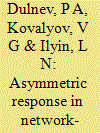

|
|
|
|
|
| Publication |
2011.
|
| Summary/Abstract |
The article analyzes the principles and features of network-centric warfare to substantiate some trends in the development of counter measures to high-tech enemy.
|
|
|
|
|
|
|
|
|
|
|
|
|
|
|
|
| 2 |
ID:
111121
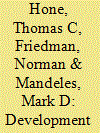

|
|
|
|
|
| Publication |
2011.
|
| Summary/Abstract |
In late 2006, Andrew Marshall, the Director of the Office of Net Assessment in
the Office of the Secretary of Defense, asked us to answer several questions: Why
had the Royal Navy (RN) developed the angled flight deck, steam catapult, and
optical landing aid before the U.S. Navy (USN) did? Why had the USN not developed these innovations, which "transformed carrier
design and made practical the wholesale use of
high-performance jet aircraft," in parallel with the
RN?
1
Once developed by the RN, how had these three
innovations "jumped the gap" to the USN?
|
|
|
|
|
|
|
|
|
|
|
|
|
|
|
|
| 3 |
ID:
114043


|
|
|
|
|
| Publication |
2012.
|
| Summary/Abstract |
The article discusses ways of enhancing the combat potential of electronic warfare Air Force units by improving the system of controlling them during air combat in conditions of network-centric operations.
|
|
|
|
|
|
|
|
|
|
|
|
|
|
|
|
| 4 |
ID:
125056


|
|
|
|
|
| Publication |
2013.
|
| Summary/Abstract |
The author surveys basic concepts and categories used in military conflict studies, their fast evolution, and changes in their substance and systemic relationships. He upholds and validates the leading role and enormous significance of missile forces and artillery in past, present, and future military conflicts. The author examines the problems confronting the missile forces and artillery and the paths they will follow in the context of current trends in warfare.
|
|
|
|
|
|
|
|
|
|
|
|
|
|
|
|
| 5 |
ID:
087823
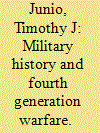

|
|
|
|
|
| Publication |
2009.
|
| Summary/Abstract |
This article examines 'Fourth Generation Warfare' (4GW), a theory of how warfare has evolved and is evolving, from the perspective of military history. The author makes three primary claims: 4GW advocates' boxing of history into 'generations' is logically and temporally inconsistent; 4GW authors misuse history by selectively choosing case studies and applying them out of context; and other arguments regarding the current and future character of warfare are more convincing. The author concludes that scholars and policymakers would be well served by considering elements of 4GW, particularly its analysis of insurgency, but that the concept should be subsumed by a broader US grand strategy that retains a strong focus on preparation for conventional warfare.
|
|
|
|
|
|
|
|
|
|
|
|
|
|
|
|
| 6 |
ID:
138742
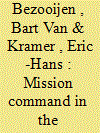

|
|
|
|
|
| Summary/Abstract |
Theory on the use of information technology in military operations assumes that bringing together units in an information network helps units to work together. Decentralized command systems such as mission command have been proposed for these networks, so that units can adapt to changes in their turbulent working environments. Others have proposed centralized command systems that permit higher organizational levels to closely direct military operations. This article uses Perrow’s (1984, 1999) Normal Accidents Theory to propose that increasing interdependencies between units in information networks places incompatible demands on the design of networked military operations. It is concluded that networked military operations require decentralized command approaches, but only under the condition that interdependencies between modules of networked units are weak rather than tight. This precondition is essential for retaining control over networked military operations.
|
|
|
|
|
|
|
|
|
|
|
|
|
|
|
|
| 7 |
ID:
117095
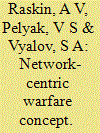

|
|
|
|
|
| Publication |
2012.
|
| Summary/Abstract |
The authors look at the fundamental characteristics of network-centric warfare, and its strong and weak points. They also examine the technical and organizational problems confronting foreign and Russian military science in efforts to make this concept practicable.
|
|
|
|
|
|
|
|
|
|
|
|
|
|
|
|
| 8 |
ID:
127412


|
|
|
|
|
| Publication |
2013.
|
| Summary/Abstract |
The authors offer their interpretation of the Russian Armed Forces' Single Information Space and suggest a feasible way to put it in place.
|
|
|
|
|
|
|
|
|
|
|
|
|
|
|
|